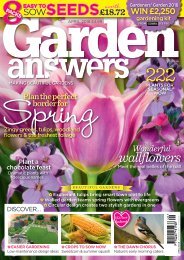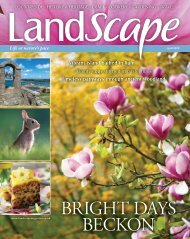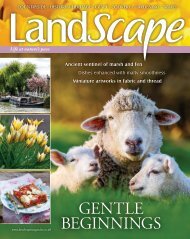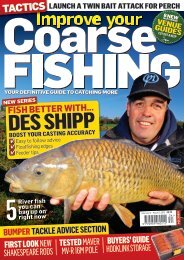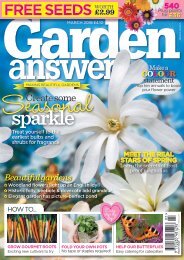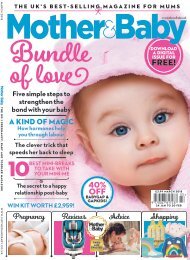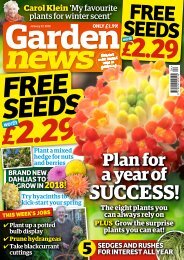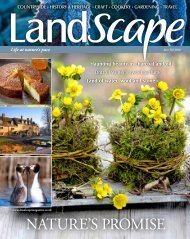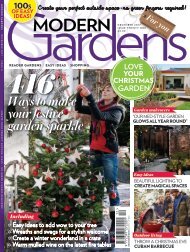Create successful ePaper yourself
Turn your PDF publications into a flip-book with our unique Google optimized e-Paper software.
Shelducks<br />
THE NEXT GENERATION<br />
David Tipling / Almay<br />
THINK 500 YEARS AHEAD<br />
In September last year, I was invited to speak to a group of MPs<br />
at the RSPB Summer Reception held in Westminster. The<br />
theme of my talk was putting nature at the heart of every<br />
decision and asking the politicians to think 500 years ahead and<br />
not just a political term of five years.<br />
But it’s not just the politicians that need to think like this, we all<br />
do. It’s clear that our wildlife needs help. It’s clear that it isn’t<br />
enough just to care. It’s clear that we all need to work much harder to change things.<br />
So what is important? This question gets me thinking all the time, and no more so<br />
than recently while out birding off the Mersey Estuary. We were watching a flock of<br />
more than a thousand Teal bobbing about. Mixed in with them was a Green-winged<br />
Teal, a scare visitor to the UK from North America and a stunning bird. But for all the<br />
people that came to see the scarce visitor, which is more important; the thousand or<br />
so Teal or the single Green-winged Teal?<br />
As a teenager, passionate about birds and conservation, I worry about what the<br />
world will look like in the future. I see the natural world slowly diminishing in front of<br />
our eyes and I feel more and more the need to speak out about it.<br />
In 2014, the WWF published a report stating that Earth has lost more than 50% of<br />
its wildlife in the last 40 years, so move forward another 40 and what will be left?<br />
How many more species of insect, bird, you name it, will I see disappear off the<br />
face of this earth in my lifetime? British wildlife is getting more and more vulnerable<br />
to the modern world and its apparent needs, and there are lots of cases to prove this.<br />
For example, the 2012 B-Line report states that since the 1930s, Britain has lost more<br />
than 97% of its wildflower rich grassland. This obviously impacts our insect<br />
populations, and to the scale that if something isn’t done we could lose anywhere<br />
from 40-70% of British insect species. Some 76% of UK Butterflies are already in<br />
decline. What then happens to the birds that feed on a range of insect species? You<br />
can’t just remove part of a food chain without then seeing damage spread out across<br />
that ecosystem.<br />
We are a small, developed country with many environmental issues to tackle, so<br />
why aren’t we all tackling them? Why are more and more species falling onto the Red<br />
List? Why are we not taking responsibility for our natural world?<br />
Getting people and businesses to listen is challenging but it can be done. I<br />
managed to engage and persuade Ecotricity last year to get involved with<br />
funding satellite tagging for Hen Harriers, after I told them about<br />
their plight. They really wanted to help and are now partnering the<br />
RSPB.<br />
So, I urge you to have a long, long think about all living species,<br />
and think 500 years ahead. Don’t just talk about the issues among<br />
yourselves, either, get shouting about it to organisations, MPs and<br />
let’s have some deafening joint action that can’t be ignored.<br />
Findlay Wilde, 13<br />
10 February 2016<br />
David Tipling / Almay<br />
TAKE PART IN THE WETLAND BIRD<br />
SURVEY (WEBS).<br />
This involves visiting a local wetland site once a<br />
month throughout the winter and counting the<br />
waterfowl there – anyone can take part, even<br />
beginners to birdwatching.<br />
Unlike many bird surveys, to carry out WeBS<br />
Counts, you don’t have to know bird songs or<br />
calls, just the ability to identify common<br />
waterbirds, so if you already know your ducks,<br />
geese and swans, but would like to get to know<br />
them even better, this is for you!<br />
VOLUNTEER ON A RESERVE<br />
There’s no better way to improve as a naturalist<br />
than to get outside with your local wildlife. Most<br />
nature reserves, whether they’re run by the RSPB,<br />
WWT, Wildlife Trusts or small local groups, are<br />
always in desperate need of help.<br />
Roll up your sleeves and get stuck in – even<br />
when the work involved is of the rather<br />
unglamorous sort (clearing drainage ditches, or<br />
thinning out scrub, for example), you’ll be doing<br />
the one absolutely essential thing<br />
for every successful birdwatcher –<br />
spending time in the field.



